
by: SEO Strategist
Ashot Nanayan
Ashot Nanayan is the CEO and Founder of DWI and a seasoned SEO strategist. With a proven track record of...
All Articles by Ashot Nanayan
December 16, 2024
15 min read
After speaking with many business owners, some of them are current SEO clients, I’ve realized that when it comes to outsourcing SEO, everyone has a laundry list of questions. And not the usual “What’s the cost?” or “Can you rank us in a week?” No, I’m talking about the crucial, behind-the-scenes details: How transparent is this company? What kind of data can they provide? Will they understand the unique nuances of my industry?
So, I rolled up my sleeves, took all those insights, and created this guide, one that goes beyond the usual spiel about “risks and benefits of outsourcing SEO.” Here, you’ll find the advanced, practical tips these business owners wished they’d known from day one. We’re diving into what truly matters: questions, expectations, and expert tips that rarely make it to the surface in other “ultimate guides.”
If you’re serious about finding the right SEO partner and want to make a choice based on real value (not just empty promises), then you’re in the right place. So, keep reading, you’re about to discover the real deal on outsourcing SEO!
If you’re already reading this article, it means you likely have some basic knowledge about outsourcing. But to make sure we’re on the same page, let’s break down what SEO outsourcing entails, who it benefits, and which industries can see the greatest value.

In simple words, SEO outsourcing is the practice of hiring an external agency, SEO consultant or freelance experts to handle search engine optimization tasks on behalf of your business.
Instead of managing SEO in-house, companies outsource various SEO services, such as keyword research, content creation, technical SEO, link building, and other services to specialists who focus on delivering measurable results in organic search.
The external SEO team typically works remotely and is responsible for providing regular updates and insights to keep the client informed on progress. In my opinion, businesses of all sizes and sectors can benefit from outsourcing SEO. However, it’s especially valuable for companies that lack in-house expertise, want to focus on core business areas, or are seeking scalable, flexible solutions.
At first glance, the difference between outsourced and white label SEO can seem a bit blurry, but here’s a simple way to look at it:
Outsourcing SEO involves hiring an external SEO agency or freelancer to handle specific SEO tasks or an entire campaign on your behalf. In this case, the provider operates under their brand and identity, and they may communicate directly with you or your client. This option is ideal for businesses or agencies that need extra expertise or capacity but do not intend to resell the service.
On the other hand, white label SEO is for agencies or consultants looking to resell SEO services under their brand. A white label provider delivers the SEO work while remaining invisible to your clients, allowing you to present the results as if they were completed in-house.
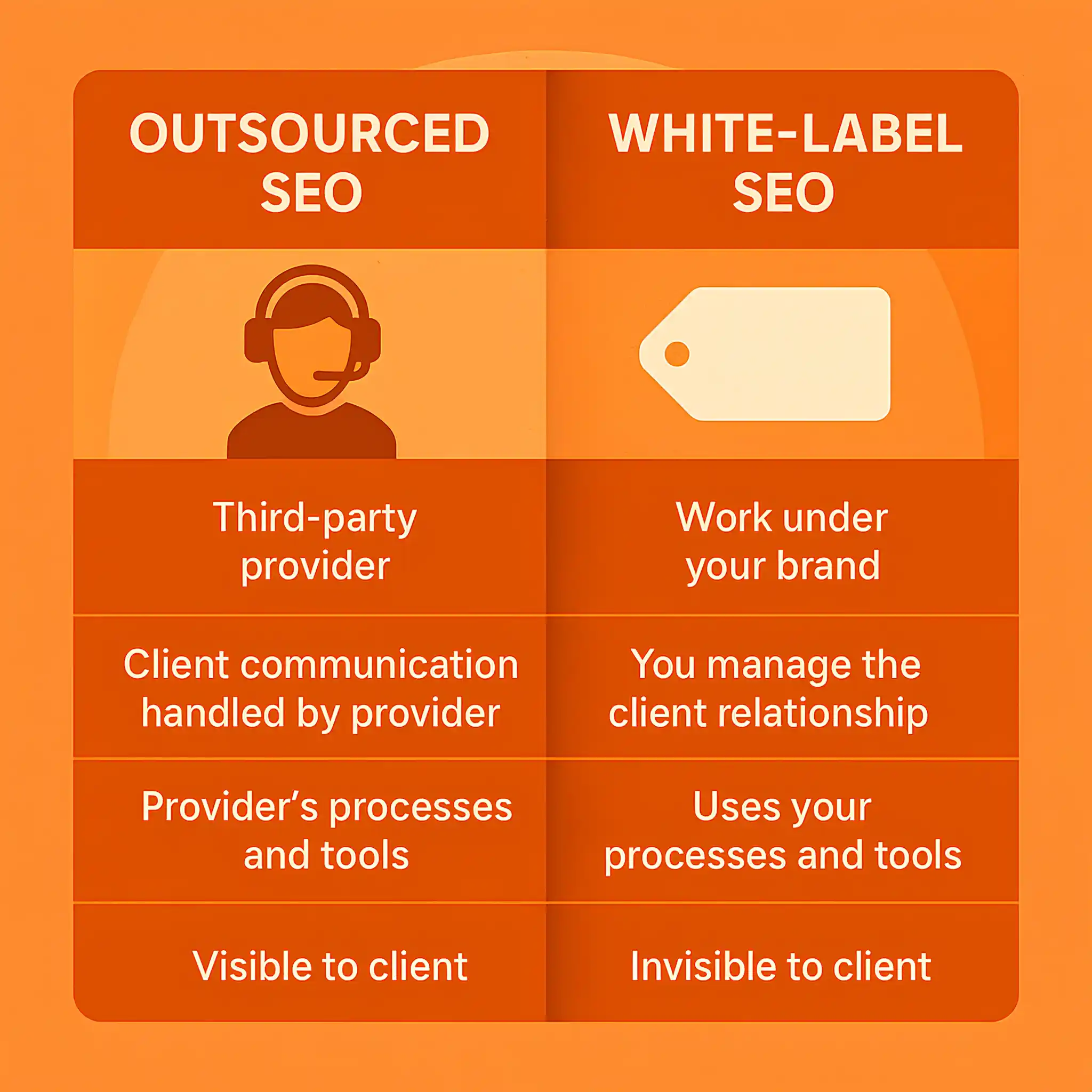
Imagine you’re a small agency that specializes in web design. A client asks if you also offer SEO services. Instead of hiring an in-house SEO team, you “white-label” SEO by partnering with an SEO company, and they do all the work under your brand name. The client sees the web design agency‘s logo on reports and emails, but an SEO company is handling the technical stuff behind the scenes.
It’s like ordering takeout versus hiring a personal chef. Outsource SEO is like hiring a chef to come to cook for you, while white label SEO is more like calling a top-rated takeout place, putting your own label on the bag, and serving it up to your friends as your own cooking!
The answer depends on your objectives and how you run your business. If you’re an agency looking to add SEO to your service list without building an in-house team, white label SEO is a fantastic option. With flexible white label SEO pricing, you can scale your offerings based on client demand, offering SEO under your brand name without needing direct SEO expertise. It lets you offer clients SEO under your brand name, scaling up without direct SEO expertise.

On the other hand, if you’re a business looking to boost your own website’s organic rankings with more direct oversight and customization, outsourced SEO may be the better fit.
In short, white label is ideal for agencies looking to expand services, while outsourcing works best for businesses needing specialized, hands-on support.
I believe certain indicators make the timing crystal clear. Business owners and agencies should seriously consider outsourcing when they reach specific growth points or face particular challenges. For example, when your internal team is stretched too thin, you’re experiencing inconsistent or stagnant results, or you recognize the need for specialized expertise to meet aggressive growth goals, it’s time to look for help.
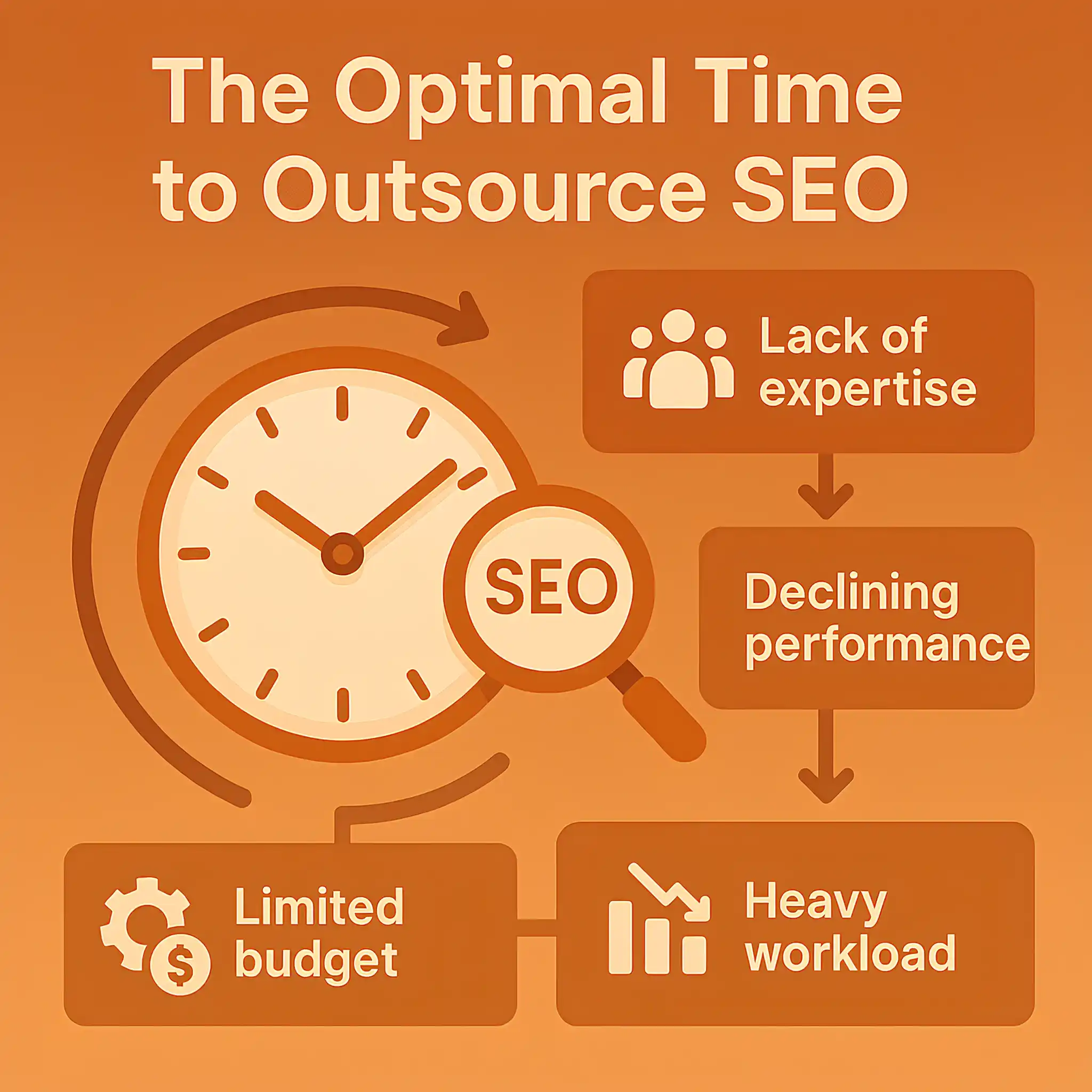
Outsourcing allows you to hand off tasks that need a high level of technical knowledge, freeing up your internal team to focus on core strengths, innovative projects, or client relations.
A Story of Overcoming the Overload
One of my close friends, who owns a digital marketing agency, was initially hesitant to outsource any part of his services, preferring to keep everything in-house.
As his agency grew, though, he found himself managing endless tasks, from client meetings and project planning to marketing and client retention. “It felt like I was running on fumes,” he admitted to me one day over coffee. His team was very busy, handling everything from content creation to SEO audits and link-building, leaving little room for strategic growth.
Eventually, he decided to test the waters and outsource SEO services for a handful of clients. The difference was immediate. “It was like a weight lifted off my shoulders,” he told me.
Not only did it free up his team’s time to focus on building better client relationships and expanding service offerings, but it also brought in a fresh perspective and specialized expertise that they hadn’t tapped into before.
He was able to grow his client base, improve service quality, and focus on what truly mattered to his agency. It’s a choice he wishes he’d made sooner, and he often credits outsourcing as a pivotal decision in scaling his business successfully.
Outsourcing SEO isn’t an all-or-nothing decision; it can be as flexible as your business needs. While some companies may benefit from outsourcing a complete SEO strategy, others might find it more effective to delegate specific SEO services.
For instance, if you’re handling a complex task like transferring your website to a new domain, bringing in an SEO agency with expertise in website migrations can ensure a smooth transition without losing valuable rankings. Similarly, if you have in-house expertise in certain areas but need support in others, you can outsource by service type, whether that’s on-page SEO, link building, or technical SEO audits.
On-page SEO is a broad category that covers everything from SEO audits to content optimization and technical improvements. Below, I’ve broken down a few types of on-page SEO services you can outsource, depending on your specific objectives and requirements.
If you’re planning to outsource keyword research services, it’s essential to do a little homework first. A well-executed keyword strategy is foundational to SEO, but the quality of research can vary greatly between providers.
To ensure you’re getting top-notch keyword research, I highly recommend asking for sample templates or previous work. This will give you an idea of the depth and structure of their research process.
Additionally, ask the agency to walk you through their methodology step-by-step, so you can assess how thoroughly they approach each phase of keyword discovery.
A good agency will strive to leave no stone unturned, exploring all relevant angles to uncover high-impact keywords that align with your goals.
Unfortunately, many companies or freelancers fall short in this area. They often just export a list of keywords from tools like Semrush or Ahrefs, assuming that bulk data alone equates to a strong keyword strategy.
Finally, whether you’re looking for keyword research for an eCommerce store, Google Ads campaigns, or Amazon listings, remember that each platform has its own set of nuances.
You can also outsource a wide range of content development and optimization services, from high-level strategy development to specific tasks like content audits, internal linking optimization, and in-depth topic research.
If your outsourcing needs include SEO content writing services, take the time to evaluate a few key aspects to ensure you’re partnering with the right team. Start by checking their industry specialization; writing for specific fields often requires a deep understanding of industry nuances.
Additionally, ask them to explain their content development process. Quality SEO content typically involves multiple steps, such as thorough topic research, creating detailed content briefs, and effective keyword research.
Lastly, make sure the agency has experience in crafting content strategies that rank high on search engines. Ask for case studies or examples of content they’ve developed that achieved strong rankings.
A proven track record will give you confidence that their strategies and execution are aligned with best practices for SEO success.
Before outsourcing technical SEO services, it’s wise to gather key information from the provider to ensure they’re the right fit for your needs.
Start by asking what CMS platforms they specialize in; technical SEO expertise can vary significantly depending on the platform.
For example, a provider with strong experience in WordPress might not be as proficient with Shopify or Magento.
Each CMS has its own unique setup, quirks, and best practices
Here’s an example: a provider may be highly skilled in handling technical SEO for WordPress sites, which often require adjustments in themes, plugins, and permalink structures.
However, they may not have the same depth of expertise working on Shopify, which has more rigid URL structures and requires a different approach to handle pagination, redirects, and canonical tags.
Similarly, Magento 2, known for its complexity, demands familiarity with more advanced development aspects like custom code adjustments and server configurations that aren’t as commonly needed on WordPress.
Backlinks make up over 65% of your SEO efforts. That’s why choosing the right partner is essential. This isn’t an area to take lightly, as poor link-building practices can do more harm than good. In today’s market, 65% of SEO agencies rely on low-quality, spammy link-building tactic such as, PBNs or link farms, or suspicious directories.
This is why link-building outsourcing deserves more caution (and a healthy dose of skepticism) than other SEO services. You can’t just trust any provider promising you a quick fix or hundreds of backlinks overnight. Quality link-building is about building real, valuable connections across authoritative sites, not cutting corners with risky tactics that might fail.
I’m here to give you the honest idea on what really matters when it comes to outsourcing link-building, sharing a few hard-learned lessons and pointers that come only from firsthand experience. Trust me, once you know what to look out for, you’ll be far better prepared to avoid common traps and find a partner who can help you build links that make a difference.
There are more than 10, maybe even 15 different link-building techniques out there, each with its unique approach and potential value. However, not all of them deliver the same level of impact. Below, I’ve highlighted the top 5 link-building techniques that consistently bring the most significant benefits
Guest posting is one of the most popular outsourced link-building techniques because it combines high-quality content creation with effective link placement on relevant, authoritative websites.
It’s a cost-effective way to secure high-quality backlinks without diverting internal resources.
Niche edits have become one of the top outsourced link-building techniques due to their efficiency, effectiveness, and ability to deliver high-quality backlinks with minimal effort.
Since there is no need to create new content, the costs are generally lower compared to other methods like guest posting or digital PR.
This makes niche edits a practical choice for businesses looking to scale their link-building efforts without compromising on quality.
Many companies choose to outsource digital PR services as a strategic way to earn high-quality backlinks.
Outsourcing digital PR allows businesses to focus on their core operations while professionals handle the complexities of outreach and link acquisition.
HARO (Help a Reporter Out) connects journalists with expert sources, offering businesses the opportunity to gain exposure in reputable media outlets.
However, responding effectively to HARO queries requires time, effort, and expertise, as competition is fierce and reporters prioritize insightful, well-crafted pitches.
That’s why many companies find professionals or agencies to outsource HARO link-building.
ABC link exchange is a strategy where three websites link in a loop to avoid direct swaps, and it’s especially effective in SaaS link-building because SaaS companies often have content-rich blogs and industry connections that make natural, high-quality exchanges easier to execute.
Before jumping into link-building, it’s important to make sure your website has something really valuable that other sites would want to link to. High-quality content, unique insights, free tools, and other linkable assets make your site link-worthy. Without these, you’re essentially trying to build a house on weak foundations.
Before outsourcing link-building, it’s essential to prepare a list of questions to vet your provider to make sure they know their craft. A well-prepared list of questions will also give you insight into their strategy, experience, and how they handle potential pitfalls like Google penalties or changes in SEO guidelines.
Here is my list (+ Desired Answers):
Question: What is your approach to link-building?
Desired Answer: We focus on white-hat link-building techniques, such as outreach, guest posting, digital PR, and creating linkable assets. Our approach prioritizes quality over quantity, making sure backlinks come from relevant, high-authority websites.
Question: Can you provide examples of websites where you’ve earned links for clients?
Desired Answer: Yes, we’ve secured backlinks on reputable sites like HubSpot, and niche-specific blogs. We’re happy to share anonymized case studies or examples to demonstrate our success.
Question: Do you use Private Blog Networks (PBNs) or similar methods?
Desired Answer: No, we strictly avoid PBNs or any black-hat techniques. All our links are earned through ethical practices to guarantee compliance with search engine guidelines and avoid penalties.
Question: What industries do you specialize in?
Desired Answer: We have experience in a wide range of industries, including SaaS, eCommerce, health, and finance SEO.
Question: Can you guarantee specific results or rankings?
Desired Answer: While we cannot guarantee specific rankings (as this depends on multiple factors), we can assure a steady improvement in your site’s authority and organic performance through ethical and consistent link-building efforts.
Question: What is your pricing structure?
Desired Answer: We offer transparent pricing based on the number and quality of links, content creation needs, and campaign complexity. Custom packages are available to suit your budget and objectives.
Question: What happens if a link is removed after the campaign?
Desired Answer: We monitor backlinks regularly. If a link is removed within the agreed period, we either replace it or secure an alternative backlink at no additional cost.
Now, you’ll be better equipped to identify providers who prioritize long-term growth over quick, potentially harmful gains. Remember, a good provider should be transparent, knowledgeable, and confident in explaining their link-building process.
I always say that it’s smart to choose a provider that aligns with your business type, whether you’re a local business, a national company, or an international enterprise. Different business types require different SEO strategies, and a provider with the right focus will better understand your unique requirements, target audience, and market challenges.
If you’re planning to outsource local SEO services, it’s essential to choose an agency with proven expertise in this specialized area.
Local SEO focuses on improving visibility within a specific geographic area, making it vital for businesses targeting nearby customers.
To make sure the agency can deliver results, ask for case studies or success stories that highlight their success with similar local businesses.
Look for examples of how they’ve improved rankings for local search terms, optimized Google Business Profiles, or driven quality traffic to brick-and-mortar locations.
If you’re considering outsourcing national SEO services, it’s essential to evaluate a few key details to ensure you’re partnering with the right agency.
For instance, you can check if the agency has a proven track record of handling large-scale campaigns or you can request case studies showcasing their past successes with national SEO clients.
Look for examples where they improved search rankings, increased organic traffic, and boosted conversions for similar industries.
If you want to outsource international SEO services, it’s essential to evaluate how the agency handles unique challenges associated with global markets.
For instance, if your target audience includes regions where content needs to be in languages the agency doesn’t natively understand, ask how they manage content creation.
A reliable agency should collaborate with native speakers or professional translators to make sure content is not only linguistically accurate but also culturally appropriate and engaging.
Additionally, consider how the agency approaches link-building in countries where backlink practices may not be as popular or established.
For instance, here at Digital World Institute (DWI), we specialize in local and national search engine optimization services but do not provide international SEO services. So, if you’re an international business partnering with us might not be the best fit.
As an SEO agency owner, there are times when I need to outsource specific tasks, like schema markup analysis or generation, website migration, or advanced analytics tracking, especially for complex or unique business models. Over the years, I’ve worked with freelancers and agencies for these services, and each option has its own set of pros and cons, which I’ve come to appreciate through firsthand experience.
Here’s a comparison table for Outsourcing an SEO Agency vs. a Freelancer:
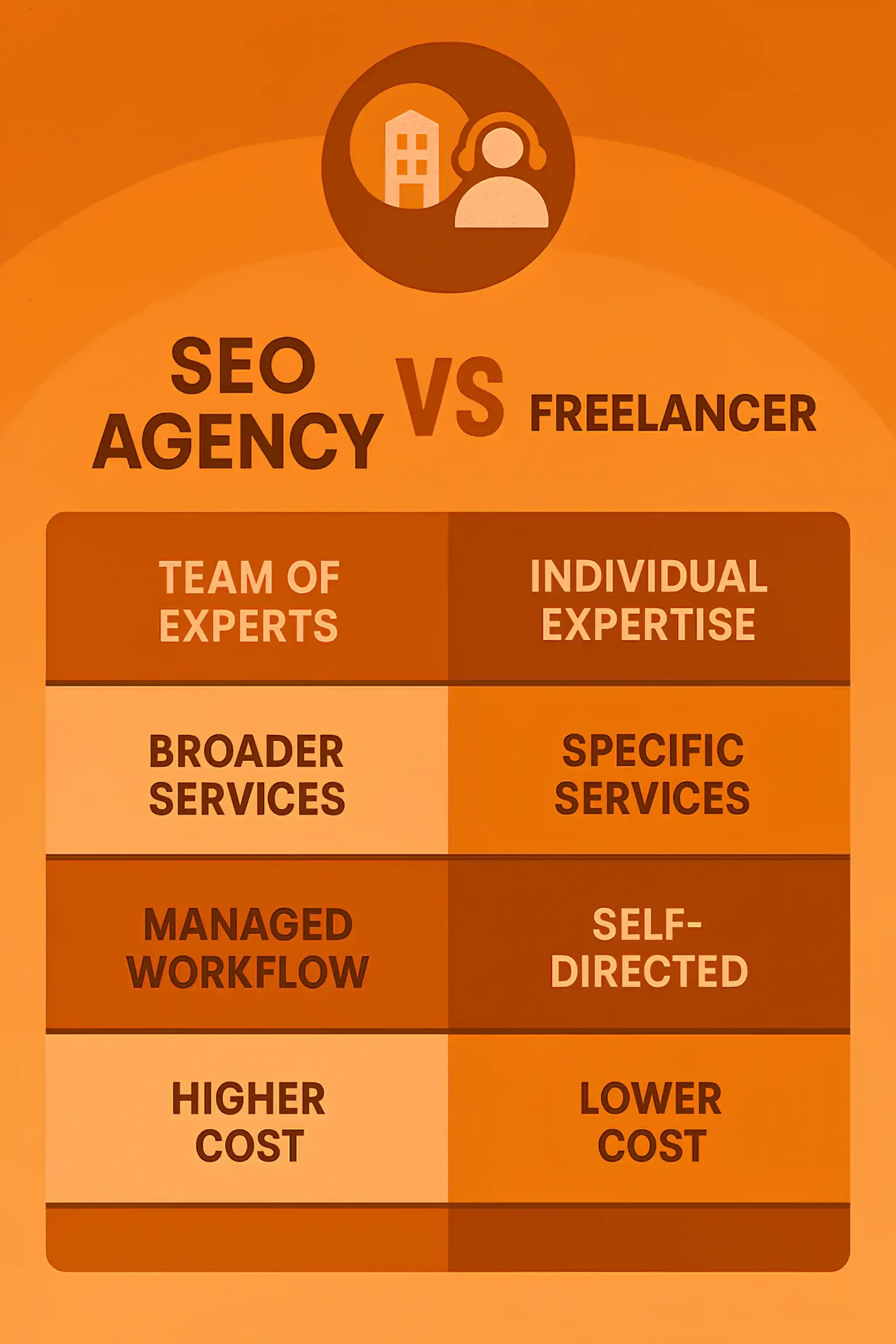
For instance, when working with freelancers, the experience can feel more personalized and flexible. Freelancers often specialize in niche areas, allowing them to bring a depth of knowledge to specific tasks. Cost-wise, freelancers are typically more affordable than agencies, which is ideal when I need to control expenses on smaller or one-off projects.
However, freelancers can sometimes be a bit of a gamble; availability can be inconsistent, and if they’re balancing multiple projects, deadlines can slip. Plus, without a team structure to back them up, you’re relying on one person’s skill set, which might not cover every nuance of a complex project.
On the other hand, outsourcing to an agency usually means a more structured approach. Agencies often come with a team of specialists, allowing for a more comprehensive skill set and built-in accountability. They have the resources to manage projects quickly and efficiently, making them ideal for larger or time-sensitive tasks.
However, agencies can be more expensive, and the service can sometimes feel less personalized. You’re typically working with multiple points of contact, which may make communication slightly more complex.
For digital marketing agencies, the choice often comes down to the project’s complexity and urgency. For example, if it’s a highly specialized task and I know a freelancer who’s skilled in that area, it’s a great way to get the work done affordably and effectively. However, for larger, more integrated projects, like migrations or when we’re facing a tight deadline, an agency can be the better choice because they have the bandwidth and resources to deliver faster without compromising quality.
For business owners who don’t have SEO expertise, I generally recommend working with an SEO agency if the budget allows. Agencies bring a more cohesive approach to projects and are more equipped to handle the complexities of SEO.
They can also provide ongoing support, which is beneficial for business owners who need guidance. However, if budget is a constraint, a reputable freelancer can still be a solid option for smaller or specific tasks, especially if the business only needs occasional SEO support.
Cost is always a factor. Freelancers or fractional SEO consultants generally offer lower rates, which can be beneficial for projects with tight budgets. Agencies come with higher price packages, but they also offer added reliability, resources, and sometimes even a team of experts for the price of one.
Outsourcing can be a real game-changer, especially for SEO agencies like mine. It helps us expand our service offerings without needing to hire full-time experts for every niche skill.
Plus, it opens up extra revenue streams, allowing us to take on specialized projects that might otherwise be out of reach. Sometimes, when a project is urgent, bringing in outside help means we can deliver top-notch work without rushing internally to meet deadlines.
Ultimately, whether you choose a freelancer or an agency depends on your priorities: the scope of the project, the budget, the timeline, and the need for specific expertise. Both options have their strengths, and knowing when to leverage each one can make a big difference in the quality and efficiency of your SEO efforts.
Outsourcing SEO can feel a bit like handing over the keys to your prized vintage car; you’re hoping the driver knows what they’re doing, but you’re still holding the edge of your seat! Letting someone else take the wheel on something as crucial as SEO has its share of excitement and, admittedly, a few risks.
On one hand, outsourcing can open up a world of expertise and save you time, but on the other, it’s essential to know what you’re getting into. Just like any big decision, it comes with a mix of wins and potential bumps along the road. So, let’s dive into the ups and downs of outsourcing SEO and see what really makes it worth the ride (or not)!
As an SEO expert, I think outsourcing SEO services can be a fantastic move, if you trust your partner. When you have a trusted partner, outsourcing doesn’t just become easier; it enhances your strategy, giving you the confidence that your SEO is in good hands. So, if you find a team you believe in, go for it, outsourcing can be one of the best decisions for growing your business.
I believe when you think about SEO outsourcing, the first question that usually pops up is, “How much is this going to cost me?” The truth is, SEO pricing can feel a bit like trying to predict the weather; there’s a range, and a lot depends on the details.
From the complexity of your project to the expertise of the provider, several factors play a significant role. Below, I’ll break down what factors affect the cost of SEO outsourcing so you can understand exactly what you’re paying for and make a choice that fits your goals and budget.
Let’s dive in and make sense of what’s behind the price range.

The Scope of the Project: First things first: the scope of your project is going to set the stage for the overall cost of outsourcing SEO. A small, focused project, like optimizing a handful of pages or creating a targeted backlink strategy, will naturally cost less than a full-blown, ongoing SEO overhaul that touches every corner of your website. Simply put, the more ground you need to be covered, the bigger the budget you’ll need.
Type of Contract: The type of contract you choose will also impact your SEO costs. You’ll often see three main options: monthly retainers, hourly rates, and fixed-cost projects. Monthly SEO retainers are ideal if you need continuous SEO work, giving you consistent service and results over time.
Hourly rates work well for smaller, specific tasks, like a one-time SEO audit or consultation. Fixed costs are usually suited to projects with a clear scope and deadline, like a site migration.
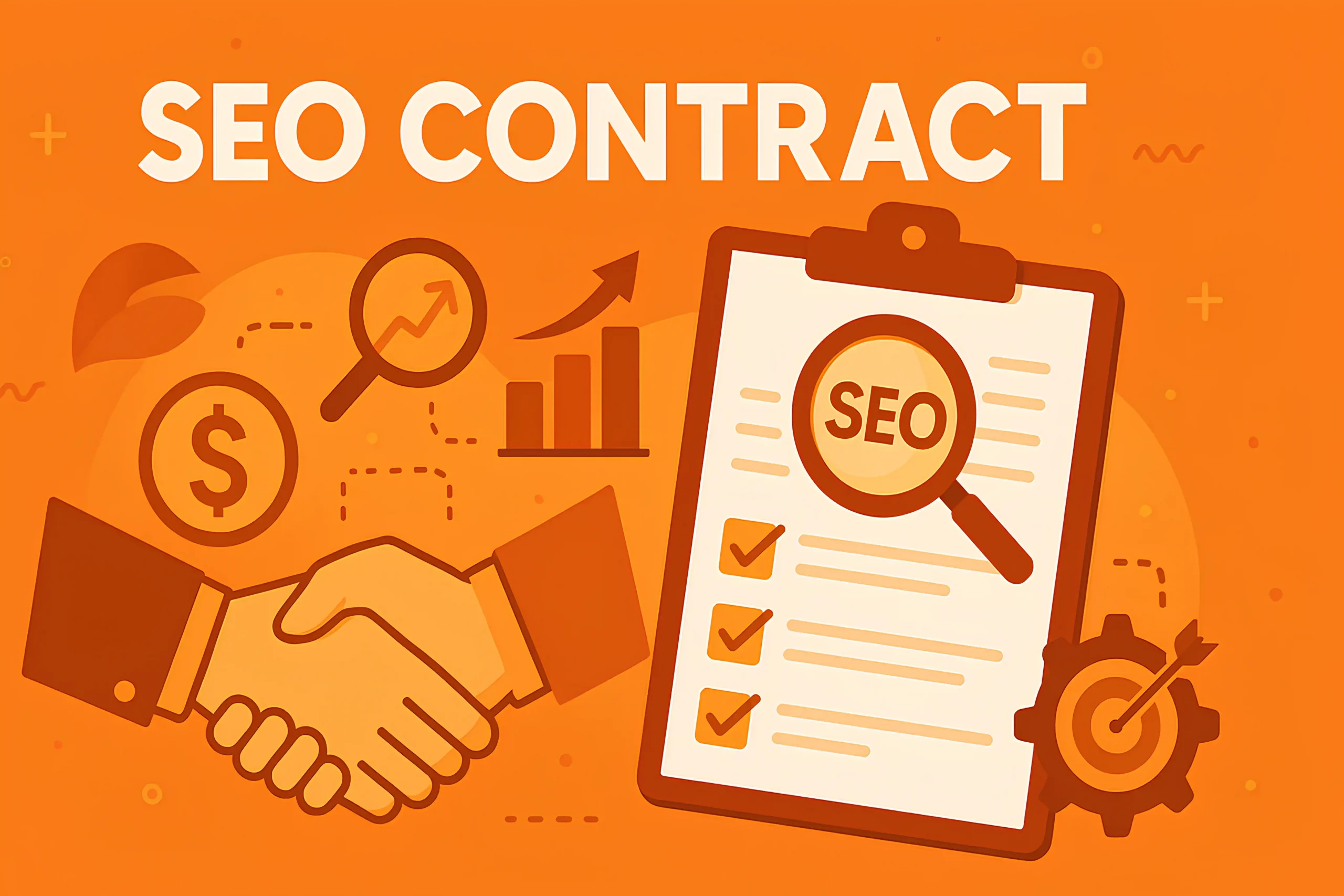
Level of SEO Expertise Required: Of course, some tasks require more skills than others. If you’re outsourcing basic SEO tasks like internal linking optimization or metadata creation, a less experienced provider may be fine, and more affordable.
But if you need advanced SEO strategies like technical SEO audits, complex analytics, or high-quality link-building, you’ll want someone with a deeper level of expertise, which often comes at a higher price. In fact, SEO audit pricing alone can vary widely depending on the scope and depth of the work, so it’s worth factoring that into your budget. Remember, experience and expertise pay off in results, so consider what’s essential for your project’s success.
Geographic Location of the SEO Provider: Providers based in the U.S., U.K., or other high-cost-of-living countries generally charge more than those in regions with lower costs of living. For example, a top agency in New York will likely have higher rates than a reputable provider in Eastern Europe or Southeast Asia.
However, the key is to find a balance between quality and cost, as SEO standards vary globally. Consider where you’re comfortable working and whether location-specific expertise (like local SEO) could add value to your project.
The cost of SEO services varies significantly across countries and between freelancers and agencies. Here’s an overview of average hourly rates in the top 10 countries:
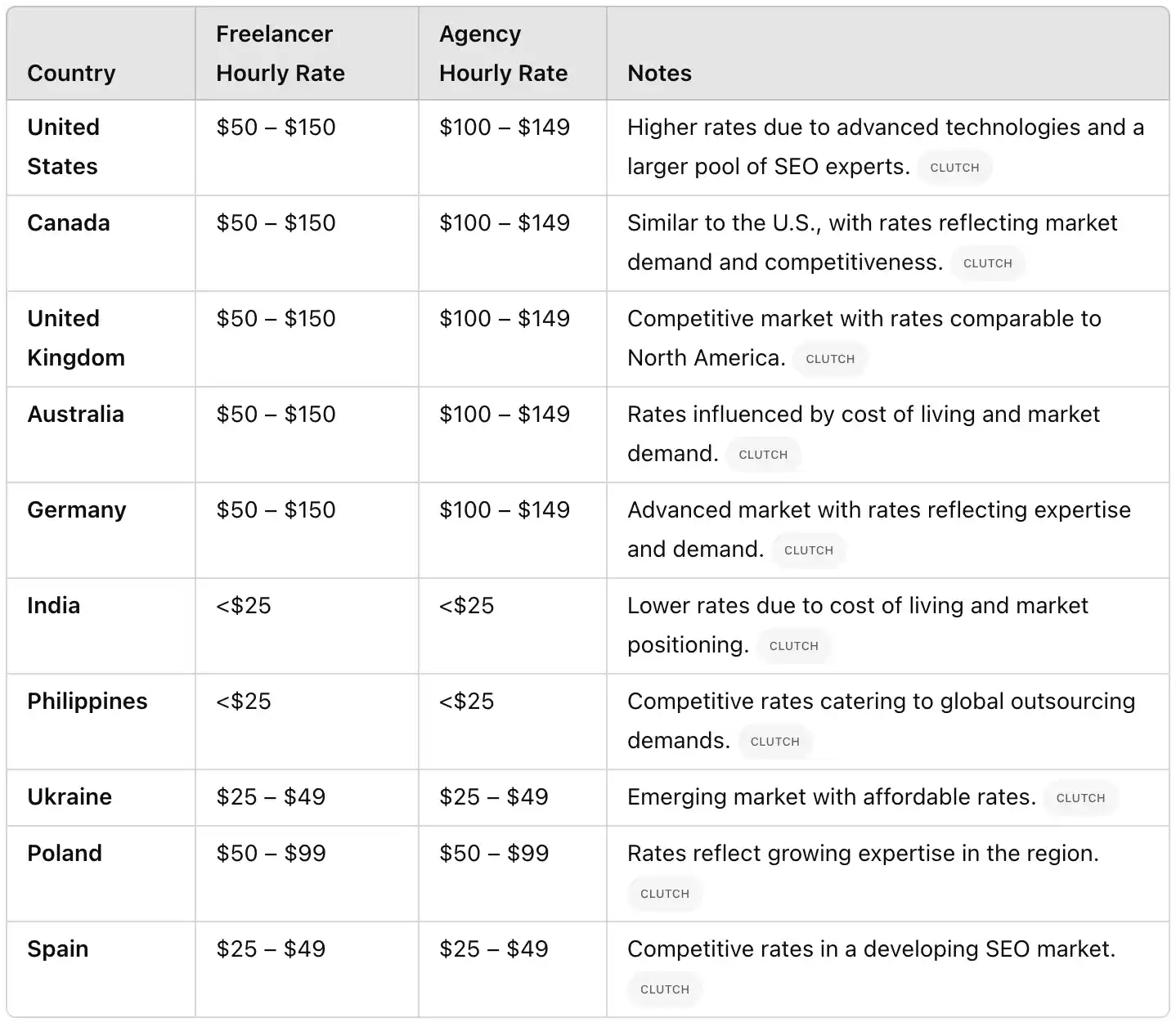
Urgency and Timeline for Deliverables: If you need SEO results fast, be prepared for higher costs. Rushed projects often require the SEO provider to prioritize your work, reshuffle schedules, and put in extra hours, which can drive up costs.
Conversely, if you have a flexible timeline, you may be able to negotiate a better rate. SEO is usually a long-term game, so if time allows, letting the provider work at a steady pace can often be more cost-effective.
Duration and Complexity of the Project: The longer and more complex the project, the greater the cost. SEO projects that take over months or involve elements (like restructuring a large eCommerce site or handling a multilingual website) require more time, attention, and resources.
The complexity of your industry also matters; for instance, niches with high competition may require a more intensive approach. The best way to budget accurately is to be clear about your project’s duration and depth, as this will help your SEO provider estimate the cost and resources needed accurately.
If you’re feeling ready and have a solid grasp of the basics, it’s time to dive into the steps for outsourcing SEO services. This process can seem a bit overwhelming, but I’ll walk you through each stage to make it as smooth as possible. From setting your goals to finding the right partner, I’ll guide you through every step to make sure you’re set up for SEO success. Let’s get started!
Before you dive into outsourcing SEO, take a step back and get clear on your objectives. Knowing exactly what you want to achieve will save you a ton of time, money, and possible misunderstandings. Are you trying to boost organic traffic? Climb the ranks for specific keywords? Or maybe you want to improve conversions on key landing pages?
Whatever it is, defining these goals up front is key.
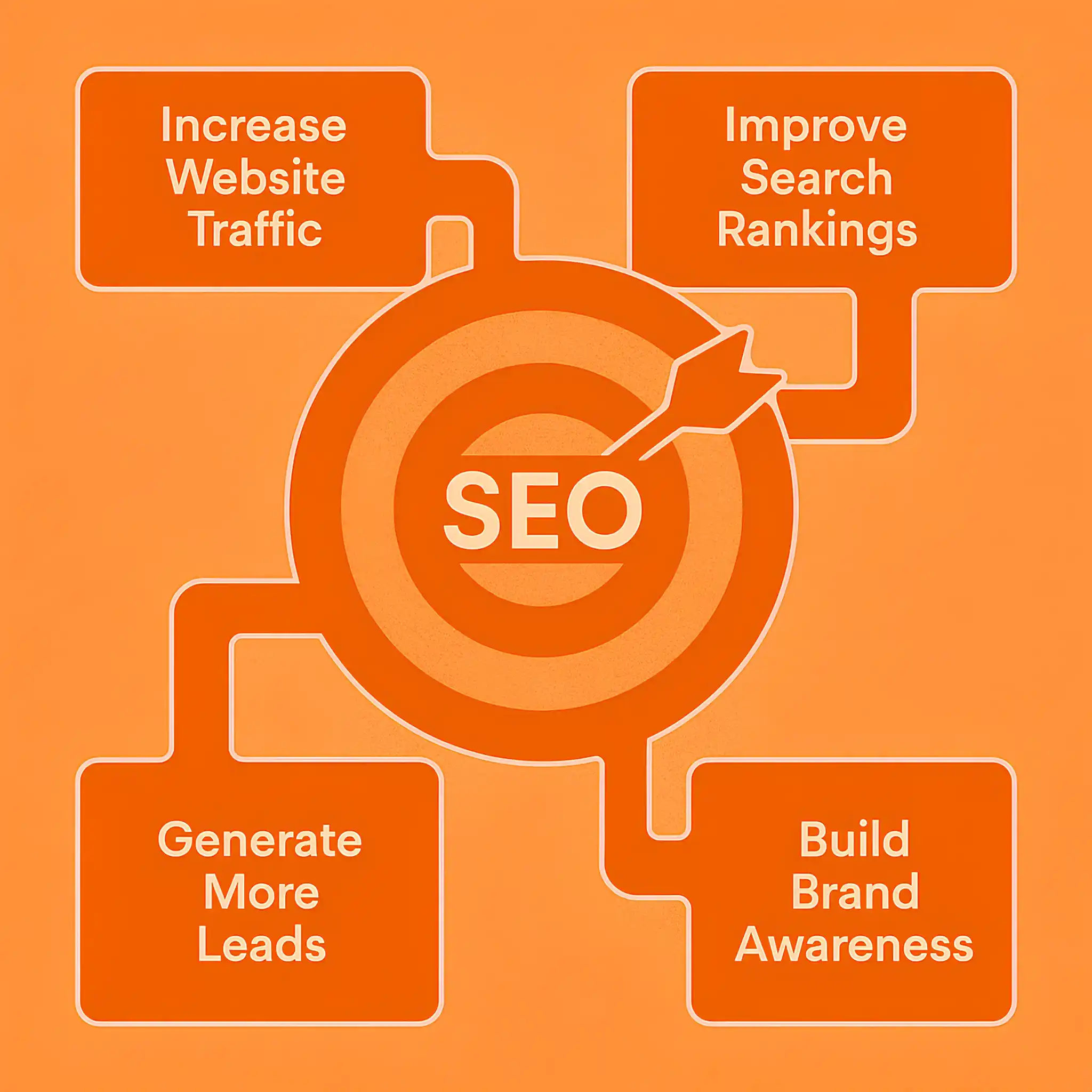
It is like ordering at a restaurant; you wouldn’t just say, “Bring me something tasty.” You’d be a little more specific, right? The same goes for SEO. When you can communicate your objectives clearly, your SEO provider knows exactly what success looks like for you.
Plus, being on the same page from day one makes the whole process way smoother. Trust me, the last thing you want is to realize halfway through a project that you and your provider had totally different visions in mind!
Next, take a moment to assess what your in-house team can realistically handle. Imagine, you’re conducting a self-audit; what skills do you already have on deck, and where are the gaps? If your team’s idea of “technical SEO” is knowing how to Google “how to improve page speed,” you might have a bit of work to do.

Assessing in-house capabilities isn’t just about finding weaknesses; it’s also about recognizing strengths. Maybe your team is great at content creation but struggles with complex analytics or effective link-building. Or perhaps you have the tools but lack the skills to use them effectively.
Being honest about what your team can (and can’t) do will make it easier to identify exactly what kind of SEO support you need, and avoid paying for things you could handle yourself with a bit of training.
So, take stock. What can your team handle confidently, and where would a little outside expertise make all the difference? Getting clear on this will help you make smarter, more strategic choices about what to outsource, and save you a few headaches along the way.
Choosing the right SEO partner might just be the most important step in your entire outsourcing journey. With thousands of freelancers and agencies out there, how do you pick the one who’ll actually deliver results rather than just fancy promises?
To start, you’ll want to check their reputation. If you’re leaning toward a freelancer, platforms like Upwork are a great place to start.

You can see verified reviews, similar projects they’ve completed, and even case studies that show their results. Plus, you get a sense of how they work from the feedback of others, which can be a goldmine for assessing compatibility.
For an SEO agency, check out platforms like Clutch.io, G2, or other platforms, where you can browse reviews from previous clients, see detailed project descriptions, and get an idea of their specialties.
You can also ask the agency directly for client testimonials, past case studies, or specific examples of results they’ve achieved. Remember, a reputable agency should be happy to share some of their success stories, if they’re hesitant, that could be a red flag!
Here’s another tip: Don’t be shy about asking questions. A good SEO partner will welcome your questions and provide clear, honest answers. Ask about their process, who will be working on your project, and how they measure success. If they’re upfront and transparent, that’s a good sign you’ve found a solid partner. So go ahead, do a little detective work, trust your gut, and choose someone you’ll be excited to work with.
If you are looking for someone who knows the ropes, has the experience, and really cares about your growth, Digital World Institute (DWI) is your go-to choice.
We’ve partnered with a wide range of companies, from startups to established brands helping them rank #1. We’re ready to do the same for you, whether you need a hand with link-building, on-page optimization, or a full-scale SEO strategy.
Ready to team up? Let’s make your SEO success story happen!
Setting clear expectations and KPIs between your company and the outsourced SEO partner is essential. I’m not just talking about the typical SEO metrics here, like rankings and organic traffic, but also about establishing KPIs that measure the success of the collaboration itself.
For example, SEO performance KPIs might include metrics like organic search traffic, keyword rankings, conversion rates, and the number of quality backlinks earned.
But on the partnership side, consider setting KPIs around communication frequency (e.g., weekly updates), response time for queries, and the completion of key project milestones by agreed-upon deadlines. Another important KPI might be adaptability; how well your SEO partner responds to strategy shifts or unexpected changes.
A communication protocol outlines how, when, and through which channels you’ll connect with your SEO provider, helping to keep expectations aligned and minimize misunderstandings.
For example, you might decide on a weekly check-in call, monthly progress reports via email, or direct messaging for quick updates and questions. Whatever the setup, having a structured approach makes sure nothing nothing gets missed, especially for larger projects that require constant updates. It also keeps both parties accountable, so you’re never left wondering about project status or upcoming deadlines.

The best practice here is to set up an initial call to discuss communication preferences and outline expectations. Are there specific metrics or results you want updates on regularly?
Is there a preferred response time for urgent inquiries? It’s also helpful to decide on one main point of contact for each side to keep communication focused and organized. This way, whenever an issue or update comes up, you know exactly who to reach out to, streamlining the process and saving time.
Before kicking off your SEO campaign, make sure you and the provider are truly on the same page. Clarity at the start will set a strong foundation. Review the initial strategy together and confirm that it covers everything you need. If anything feels unclear, don’t hesitate to ask questions; it’s better to iron out any confusion now than to backtrack later.

Once the campaign is rolling, measuring progress over time is essential. Track the results regularly: weekly, monthly, or as agreed, and be prepared to adjust the strategy if necessary. You should consider changes if, for example, the data shows unexpected shifts in traffic, search trends, or if a particular tactic isn’t delivering as expected. SEO is dynamic, so adjusting the approach based on performance data or emerging opportunities is a smart way to stay competitive.
If you’re new to SEO, I’d recommend reading a few beginner-friendly articles to get familiar with the basics before you start working with a provider, or simple hire an SEO coach. Even a bit of foundational knowledge can help you understand the process better, allowing for smoother communication and setting you up for a more successful partnership.
Based on my expertise in the field, I’m going to break down the key components every SEO outsourcing contract should include to avoid any potential pitfalls. Having these essentials in place will help protect your investment, set clear expectations, and establish a strong foundation for a successful partnership.
Start by clearly defining the scope of SEO services your provider will deliver. This section sets expectations, whether it’s on-page optimization, link-building, technical audits, or content creation.
Specify how long the contract will last. SEO often takes time to show real results, so a minimum commitment (e.g., 3, 6, or 12 months) is common. You can also ask for a two weeks trial period to make sure you can work together.
This one’s straightforward but essential: outline payment details, including the amount, payment method, and schedule (whether monthly, quarterly, or on completion). Transparency here prevents miscommunication and ensures both sides are clear on how and when payments will happen.
Define key milestones and deliverables to track progress. For example, you might set monthly goals, such as completing a technical audit in the first month or delivering a set number of optimized blog posts per quarter. These markers give you and the provider clear checkpoints to measure progress and ensure everything’s on track.
To assess the effectiveness of SEO efforts, establish the performance metrics and reporting frequency. Metrics might include keyword rankings, organic traffic growth, or backlink quality, while reports could be delivered monthly or quarterly. Regular reporting keeps you in the loop and lets you measure success objectively.
If you’re sharing sensitive data, such as analytics, account logins, or customer information, include clauses on confidentiality and data protection. This assures that the provider will handle your information responsibly and comply with privacy standards, especially if any regulations like GDPR come into play.
Define the terms for ending the contract early, whether due to unsatisfactory performance, breach of agreement, or other reasons. Be clear about notice periods, potential penalties, and any refunds. This gives both parties a roadmap for exit, should things not go as planned.
Clarify who owns the work after it’s completed, especially if the provider is creating content or building assets. Typically, you want full ownership of any SEO-related content, backlinks, or site improvements. This way, you retain control over your SEO investments even after the contract ends.
Set expectations for how you’ll communicate. Will there be weekly check-ins, email updates, or dedicated Slack channels? Clear communication methods keep both parties aligned and ensure that you’re always in the loop on ongoing efforts and changes.
SEO can involve data usage, content creation, and other factors subject to legal and compliance standards. Outline any specific obligations the provider must meet, such as adherence to industry guidelines, copyright laws, or data protection regulations. This ensures they’re working within the boundaries that apply to your business.
Sometimes, goals or market conditions shift. Include protocols for revising or amending the contract as needed. This could involve mutual agreement on changes via written consent or a formal amendment document. This flexibility allows the contract to evolve alongside your business needs.
No one likes to think about disputes, but it’s wise to have a plan. Specify how any disagreements will be handled, whether through mediation, arbitration, or court proceedings. This gives you and the provider a fair way to address issues if conflicts arise.
Based on my years of experience working with a variety of companies, freelancers, and individuals, I’ve learned a few things about outsourcing SEO that can make a big difference. If you’re thinking about bringing in outside help for SEO, some key steps can save you time, money, and, honestly, a lot of frustration.
One of the biggest pitfalls I’ve seen is a lack of clarity on who’s responsible for what, which, honestly, can turn a well-planned SEO strategy into a tangled mess. When you’re working with an SEO agency or freelancer, clearly defining roles between them and your in-house team is essential.
Outline exactly who’s in charge of reporting, who’s implementing technical fixes, and who’s managing content creation. Is your team doing the on-page adjustments, or will the agency handle those? What about tracking performance metrics and sending reports?
Without this clarity, you’re bound to hit roadblocks. When responsibilities are left up in the air, it leads to confusion, missed deadlines, and, ultimately, poor results. I can’t tell you how often I’ve seen projects go sideways simply because everyone thought someone else was handling a task. The key is to set those expectations upfront.
A well-organized workflow helps you and your SEO partner know exactly where things stand at each stage, making sure nothing gets missed. It’s much easier to track progress when you know what’s expected and when, and it holds your SEO provider accountable for delivering each phase on schedule.
Plus, with regular reviews built in, you can address issues quickly and make sure your goals stay on track.
It’s easy to assume that everything’s on track once you’ve handed off the work, but consistent, high-quality results require a dedicated process for reviewing what’s delivered. Set up regular check-ins, review deliverables closely, and don’t be afraid to give constructive feedback to make sure the work aligns with your standards and your objectives.

SEO can be nuanced, and small errors or missed opportunities can add up over time if left unchecked. Whether it’s analyzing the quality of backlinks, double-checking on-page optimizations, or making sure keyword strategies align with current trends, regular quality control allows you to catch issues early on.
Regularly scheduled reviews with your SEO team are essential; they give you a front-row seat to the progress, challenges, and wins in your strategy. In these meetings, the SEO team should present the latest results, explain what’s working and what isn’t, and discuss how they plan to adapt strategies based on new insights. These aren’t just status updates; they’re opportunities to make sure your goals and their approach stay aligned.
You’ll feel more confident in the process, and the team will have clear, actionable feedback to keep improving your SEO performance. So, set up those regular reviews, ask questions, and make sure you’re actively involved in every step; SEO is a partnership, and good communication is the foundation.
I do believe it’s really important to go beyond the typical metrics that most agencies throw at you: traffic, rankings, and keyword positions are great, but they don’t always tell the whole story. To truly understand the impact of your SEO efforts, you need to focus on the metrics that matter most to your bottom line, like conversions, sales, and leads.
Ask yourself: are these SEO activities driving new customers? Is the content bringing qualified leads? Are visitors taking meaningful actions on your site?
When you’re reviewing reports, dig deeper. Instead of just looking at a traffic boosts, ask the agency what percentage of that traffic engaged with your content, signed up for your services, or made a purchase. A good SEO provider will be able to show you how their efforts are contributing to real business goals, not just vanity metrics.
If they’re only giving you data on clicks and impressions, that’s a red flag. You want insights that translate into tangible outcomes for your business, so make sure they’re prepared to give you more than just surface-level numbers.
This is very important because metrics that only scratch the surface won’t help you make informed decisions about your business. To maximize your SEO investment, you need reports that show the full picture; the real, lasting impact SEO is having on your growth. This way, you’re not just seeing traffic; you’re seeing how SEO contributes to your bottom line.
Outsourcing enterprise SEO services isn’t just a bigger version of outsourcing regular SEO; it’s a completely different game. Enterprise websites come with massive page counts, complex architectures, multiple stakeholders, and often, multi-language or multi-location setups.
To be honest, not every SEO agency can handle that. Many smaller agencies might deliver great results for local or mid-sized businesses but struggle to manage the scale, reporting, and coordination that enterprise-level SEO demands. Your selection process needs to be far more rigorous.

When considering partners, start by looking for agencies with proven experience in enterprise projects, not just claims. Ask for case studies that match your industry, site size, or market structure. Review their reporting style and communication processes, because with enterprise SEO, you’ll need ongoing coordination between your internal teams, web developers, and the agency.
Make sure they have the resources for deep technical SEO, large-scale content optimization, and experience to integrate AI into daily SEO workflows that can be rolled out across hundreds or thousands of pages without losing quality.
Cost is another factor. While standard SEO retainers might run in the low thousands, enterprise SEO often starts around $5K–$25K per month, and for global, multilingual, or highly competitive niches, it can go well above $50K.
Treat the hiring process like you would for a high-level strategic partner. Go beyond the sales pitch. Interview the team members who will work on your account, check how they handle technical audits, and test their ability to navigate complex approval chains.
Why not! Small businesses can benefit from outsourcing SEO, but there are a few nuances to keep in mind to make sure you’re getting the best value.
First, consider the scope of services you need. Small businesses might not need a massive, multi-tiered SEO package. Instead, focus on essentials like local SEO, on-page optimization, and content tailored to your specific audience.
Another nuance is budget sensitivity. Small businesses often have tighter budgets, so it’s essential to find an SEO provider that can work within your financial limits. Look for agencies or freelancers that offer flexible packages, allowing you to gradually scale services as your business grows. This way, you don’t overextend your budget but still get the support you need to start building an online presence.
SEO is an investment, and if you’re outsourcing solely based on price, you’re likely sacrificing quality. Cheaper providers often rely on low-effort tactics that can end up hurting your site in the long run. Instead of going for the lowest price, consider the value and expertise the provider offers. A slightly higher investment can yield far better results.
Without a clear understanding of what you want to achieve, it’s tough to measure success. Many business owners dive into SEO outsourcing without defined goals, leading to misaligned efforts and disappointment. Be specific; outline your objectives, timelines, and expected outcomes, so both you and the provider are on the same page.
A lot of providers promise the world, but only a few can deliver. Always ask for case studies, testimonials, or references that showcase their success. An experienced provider should have a proven track record of results in your industry or similar markets.
SEO is a long-term game, and consistent communication is key. If you’re not receiving regular, transparent updates, it’s hard to know if the strategy is working. Make sure you establish a reporting schedule and understand how they’ll keep you informed about progress and challenges.
SEO has evolved, and tactics that worked a few years ago, like keyword stuffing or mass link-building from poor-quality sites, can now lead to penalties. Make sure your provider uses up-to-date, white-hat SEO techniques that align with Google’s guidelines.
Every SEO provider has their own approach. Failing to ask about their process can lead to misunderstandings down the line. Ask them how they plan to achieve your goals, what tools they use, and how they will adapt strategies if needed. This will help you understand their approach and whether it aligns with your business.
I’ve put everything into this guide to give you the most complete, no-nonsense view of SEO outsourcing, doing my best to leave no stone unturned. Whether you’re just starting to consider outsourcing or you’re ready to make the leap, my goal was to ensure you have every detail, insight, and practical tip needed to make the best decision for your business.
If you’re searching for a reliable, results-driven outsourced SEO agency, Digital World Institute (DWI) could be exactly what you’re looking for. So, if you’re ready to take your SEO strategy to the next level with a team that genuinely cares about your growth, DWI can be your go-to choice for SEO outsourcing.